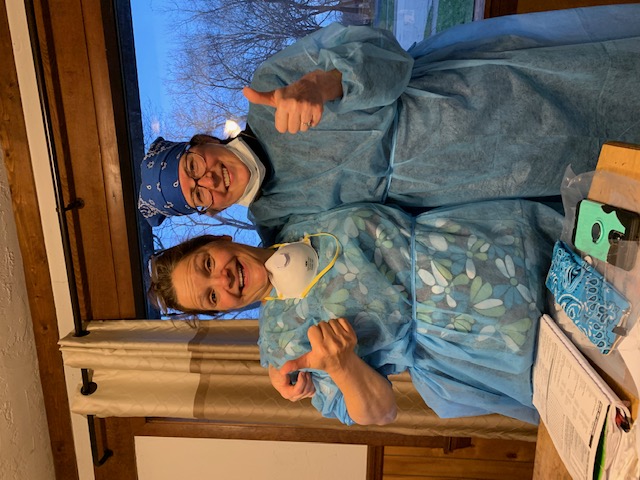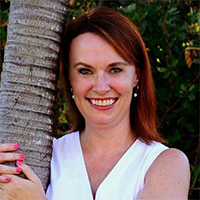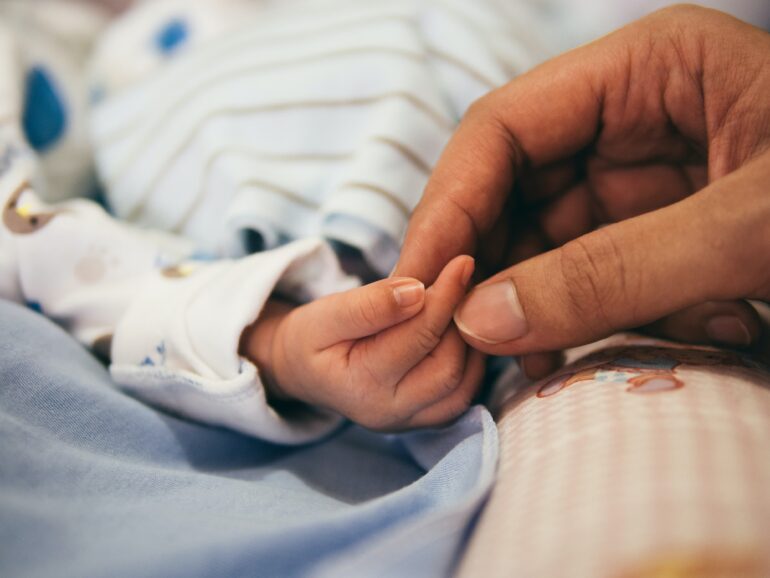Pregnancy and birth are momentous for parents at any point in time, but having a baby in the middle of a pandemic presents its own unique set of circumstances and challenges. As Dr. Scott MacGregor, DO, an obstetrician specializing in high risk obstetrics at NorthShore University HealthSystem notes, “Not many people can say they were born during a pandemic.”
We spoke with new and expectant moms and healthcare providers to understand what having a baby in the time of COVID-19 is like.
What to expect when expecting during a pandemic
There is some good news for expectant mothers. “The data we have so far indicates pregnant women are no more susceptible to this virus than non-pregnant people,” says MacGregor. He notes that COVID-19 is different from some other illnesses, including influenza, which pregnant women are more susceptible to. Also, he says early data suggests that the virus does not cross the placenta, meaning the fetus is not at risk.
Pregnancy often means many doctor visits, but for low-risk patients, some regular visits can be done using telemedicine. “Telehealth has made it possible to have meaningful visits without traveling and waiting,” says MacGregor. In Illinois, blood pressure cuffs were approved for all pregnant women, and he says that that has made it possible to cut the number of in-person visits in half for some patients.
For appointments that are conducted in-person, most offices have changed their policies including taking the temperature of each patient upon arrival, increasing distancing in the reception areas and not allowing other children to be present.
Ultrasound appointments often are done with only the mother present. While Kate Goshorn of Chicago was disappointed that her husband could not be present for the final ultrasound, they decided instead to FaceTime so he could still share the experience. Providers have been liberal in allowing video participation and many send home either pictures or a video clip.
Pregnant women are encouraged to follow all the guidelines regarding staying home when possible and wearing a mask and social distancing when going out. MacGregor says his patients are excelling at following the guidelines, noting, “pregnant women are more motivated than a lot of people.”
Giving Birth Safely
Fear of contracting the coronavirus is considered a large reason emergency departments saw a 42 percent drop in patients in April, according to Morbidity and Mortality Weekly Report.
Midwife Debbie Boucher APRN-FPA, CNM, of Childbirth the Way Nature Intended, Inc., in Lake Barrington, Illinois, has seen an increase in calls from women, including those due to give birth soon, looking to switch from a hospital to home birth. She is limited in the number of women she can accept and notes that a woman “must be low risk to qualify for a home birth.”

Despite the pandemic, “the rest of the obstetric experience is not changed,” as Dr. Micah Garb, MD, obstetrics and gynecology at Northwestern Medicine Lake Forest Hospital says, noting there are still risks involved, including maternal bleeding and fetal distress. Because of those risks, he believes “it is always better to be in a setting ready to manage those issues than elsewhere” and that hospitals are very prepared and taking many protective measures.
“I believe that the hospital is less likely to result in a COVID exposure than a grocery store,” says Garb. “We have implemented pre-procedure COVID testing across the hospital for all scheduled admissions or surgeries. COVID patients are isolated in designated areas. Room turnover and cleaning routines are very focused and intense. 100% of people are masked at all times.”
Being in a hospital giving birth alone became a fear for many pregnant women when a few hospitals in New York City did not permit partners to be with birthing mothers. Audrey Abboreno of Barrington, Illinois, gave birth in late March, just as stay-at-home orders were being issued and not having her husband by her side to be present for his son’s arrival was her biggest worry.

While hospital policies vary and are constantly evolving based on the latest data, most permit expectant mothers to have a support person present unless they have tested positive for COVID-19. For some, that means doulas cannot be with them in person. When that is the case, Juanita Montoya, a certified holistic doula with Chicago Family Doulas, can labor at home with clients and ride with them to the hospital. She then supports them through live video, often using Skype.
When comparing the birth of Louie to the birth of her older son, Abboreno says, “The biggest difference, which was no surprise was all staff was wearing a mask at all times.”
Bringing Up Baby
Once the baby has arrived, families are finding that caring for a newborn can also be quite different than it was before the spread of the virus. Guests are limited, partners may be working from home, grandparents are at risk, and older siblings are in need of more care with school and camps and childcare not operating as normal.
Abboreno said the health care providers at the hospital where she gave birth and her son’s pediatrician stressed social distancing, noting it was especially important to do so to protect older individuals such as the baby’s grandparents. The first time her in-laws met baby Louie, they sat on the opposite side of the patio and limited their visit to just a few minutes.
While social distancing with visitors is important, not all medical care can be given from six feet away. Pediatricians are communicating with parents about how to handle appointments. Jamie Mack of Chicago says that her pediatrician’s office assured her they were conducting only essential appointments in person and doing all others virtually. When she and her baby, Guy, arrived at the office they were immediately brought into an exam room, the doctor wore a mask and the precautions taken made her feel safe. “It all happened quickly. I am glad we went,” she says.

The American Academy of Pediatrics (AAP) launched the #CallYourPediatrician campaign to encourage parents to schedule check-ups for children of all ages, noting that it is particularly important for parents to stay current with available vaccines. “As states begin to open up and families move about in their community, we are afraid that we could see outbreaks of measles, whooping cough and other diseases that can spread very rapidly and be deadly for children,” said AAP President Sally Goza, MD, FAAP in a statement.
The stress of caring for a newborn in this changed environment can be a significant challenge for new parents.
“It’s one of the most intense situations I’ve ever had to deal with and it’s bringing up so much anxiety,” Nikki Clifford of Fairfax, California, says of having an infant in the middle of a pandemic. Her daughter Sydney was born in early January. Clifford adds that homeschooling her kindergartener compounded the stress. “I feel like I’m working multiple jobs day and night.”

Perinatal mood disorders, including but not limited to postpartum depression, occur in even the most normal of times. Experts fear that the social isolation and additional new mothers face during a pandemic will lead to increased cases. Adults in families with new babies should know the warning signs and ways to get help and encourage struggling moms to seek professional help. Telehealth visits with mental health providers may make it easier to get the necessary help.
Despite the challenges, there are also some silver linings to growing a family now.
“There are moments that we all laugh and have fun on a family walk on a beautiful weekday and I’m grateful that we’re healthy, safe and together during a crazy uncertain time,” Clifford says.
How to Help:
Many are finding that helping others is an effective way to help combat feelings of powerlessness in the face of COVID-19. Here are some organizations that need your help in Chicago and the Bay Area right now.
More from Better:
- 16 Chicago Nonprofits That Urgently Need Your Help During the COVID-19 Pandemic
- Telemedicine: What You Need to Know About Virtual Health Care in the Face of COVID-19
- From COVID-19 to Fashion: The Global Ripple Effect of Our Actions
 Shannan Younger is a writer living in the western suburbs of Chicago with her husband and teen daughter. Originally from Ohio, she received her undergraduate and law degrees from the University of Notre Dame. Her essays have been published in several anthologies and her work has been featured on a wide range of websites, from the Erma Bombeck Humor Writers Workshop to the BBC. She also blogs about parenting at Between Us Parents.
Shannan Younger is a writer living in the western suburbs of Chicago with her husband and teen daughter. Originally from Ohio, she received her undergraduate and law degrees from the University of Notre Dame. Her essays have been published in several anthologies and her work has been featured on a wide range of websites, from the Erma Bombeck Humor Writers Workshop to the BBC. She also blogs about parenting at Between Us Parents.

